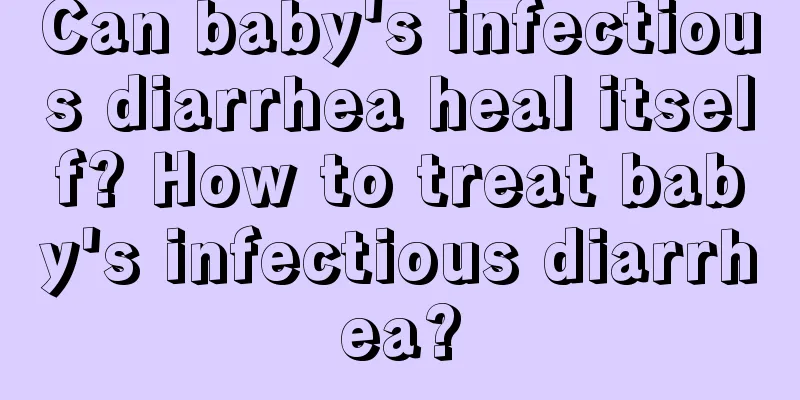Can newborns drink glucose water? What are the hazards of drinking glucose water for newborns?

|
The organs of newborns are not fully developed, so there are many things to pay attention to in daily diet and care. Glucose water can supplement calories and sugar, has high nutritional value, and is a very common healthy drink. Can newborns drink glucose water?Newborns do not need to be fed with glucose water deliberately. "Can newborns drink glucose water?" is a question in the minds of many parents. Some people would rather believe it in order to increase the baby's nutrition, so they use glucose water between two meals to supplement the baby's nutrition and appetite. In fact, there is no need to feed with glucose water deliberately. Babies can be fed with boiled water between two meals of milk to increase water intake, moisten the mouth, and reduce phlegm in the throat, but there is no need to use sweetened glucose water, because the sweet taste can easily satisfy the appetite, making the baby unwilling to eat the milk for the main meal, and it is easy to enter the anorexia period early. The nutritional content of glucose water is far less than that of normal milk, and it will cause problems in nutrition after a long time. After drinking, the sugar water will stay in the mouth for too long, and it is easy to ferment with bacteria to produce acidified saliva, which will damage the baby's fragile milk teeth early (caries). After eating sweets in childhood, it is difficult to quit in the future, and it is easy to become obese after a long time. Although medical research in recent years has found that feeding a crying baby sugar water can help him sleep better and reduce his crying behavior, this should only be done occasionally and should not become a habit. Harm of drinking glucose water for newborns1. Affects the intake of boiled water and milk Glucose is usually mixed with water for babies to drink. Once babies taste something sweet, they will easily become resistant to tasteless breast milk, formula milk, boiled water and other liquids that are important for growth and development, and may easily suffer from malnutrition. 2. It is easy to develop a picky eating habit After babies get used to the sweet taste, as they grow and develop, they will make the same choices for complementary foods, adult foods, etc. Babies will develop a habit of partiality. Moreover, excessive sugar intake is not good for human health and is more likely to cause diabetes. 3. Entering the anorexia phase early Sweetness can easily satisfy the appetite, making the baby unwilling to drink milk for meals, and easily entering the anorexia period early. Moreover, the nutritional content of glucose water is far less than that of normal milk, which will cause nutritional problems in the long run. 4. Easy to damage the tooth surface After drinking glucose water, the sugar water will stay in the mouth for too long, and it is easy to ferment with bacteria to produce acidified saliva, which will damage the baby's fragile deciduous teeth early (tooth decay). When the child's gastrointestinal absorption is poor, especially when hypoglycemia occurs, it is very necessary to supplement glucose in time. However, for babies with normal diet, additional glucose supplementation has a great negative impact. Therefore, parents should pay more attention to giving their babies glucose water. Can drinking glucose water cure jaundice?1. First of all, we need to find out what kind of jaundice the child has. Neonatal jaundice is generally divided into two categories: physiological jaundice and pathological jaundice. Physiological jaundice is a normal physiological phenomenon. Due to the metabolic characteristics of neonatal bilirubin, about three-fifths of full-term infants and more than four-fifths of premature infants may develop jaundice 3-5 days after birth, but the general condition is good. The jaundice of full-term infants disappears within 14 days, and the jaundice of premature infants can be delayed to 3-4 weeks. 2. At this time, you can give your baby more warm water, glucose water, and take your baby out to the sun. Pathological jaundice is abnormal and is generally related to the following factors: hemolytic jaundice, infectious jaundice, obstructive jaundice, breast milk jaundice, etc. The characteristics of jaundice caused by different reasons are different. Therefore, glucose water can help neonatal physiological jaundice to reduce yellowing. If it is pathological jaundice, the child should be taken to the hospital for treatment as soon as possible. In fact, it is better not to give it to the child if you can avoid it. Think about it, if the child is used to the sweet taste, it will be troublesome if he is unwilling to drink water in the future! Therefore, it is recommended that parents and friends try to give their children boiled water. Artificially fed babies must drink plenty of water.The more water he excretes, the more water he needs. It's just like when we are hungry, we want to eat everything and everything tastes good. So you should let him exercise more during the day, consume more, and sweat more (wipe dry after sweating to avoid catching a cold). When his body is hungry and thirsty, he will naturally want to drink water. For example, when my baby had a fever, he drank a lot more water than usual because of his "hunger and thirst". Children are particularly sensitive to sweetness. Some children who are used to drinking sugar water are unwilling to drink boiled water. However, eating too much sweets will damage teeth and affect appetite. Parents should not let their children develop the habit of drinking only sugar water. For the habit that has been formed, the concentration of sugar water can be gradually reduced. The time and frequency of eating sugar should also be limited to slowly correct this habit. You will find that the less sugar is eaten and the less sugar water is fed, the more appetite the child has. Babies need a lot of water every day. The amount of water each time they are fed is about half of the amount of milk per meal. 30 ml in the first week after birth; 45 ml in the second week; 50-60 ml after 1 month; 60-75 ml at 3 months; 70-80 ml at 4 months; 80-100 ml at 6 months; 100-120 ml at 8-12 months. In summer, the amount of water should be increased appropriately. Drink water more frequently when you have a cold, fever, vomiting or diarrhea and dehydration. Remember, boiled water is boiled water, and fruit and juice cannot replace water. |
<<: How to communicate with rebellious children?
>>: Children's Bedtime Story: Soothing the Grumpy Princess
Recommend
Why are early childhood education classes so expensive? How to choose an early childhood education course?
Early childhood education courses are becoming mo...
What are the harms to children's health if they don't eat breakfast?
The starting point of the day is breakfast! But n...
Is it okay not to shave the baby's hair? When does the newborn's hair fall off?
Many parents will shave their baby's hair as ...
Do babies need to drink water after drinking milk powder? How much water should babies drink every day?
Babies are very fragile and we must take good car...
Nice and non-tacky girl names Nice and non-tacky girl names
A person's name is very important and will ac...
Can milk ringworm be removed with milk? Can milk ringworm be removed with milk?
Milk ringworm is a common problem for babies when...
Can a four-month-old baby drink juice? Can a four-month-old baby drink juice?
When the baby is four months old, you can try to ...
Can children eat pomegranate seeds? What are the benefits of eating pomegranates for children?
Pomegranates are available in the autumn of each ...
What should I do if my baby has blisters in his throat? What is the reason for blisters in my baby's throat?
The blisters in the baby's throat are oral he...
Can pregnant women breastfeed when they have a cold? It depends on the specific situation.
Whether a pregnant woman can breastfeed when she ...
What causes baby colic and how to relieve colic
A few weeks after birth, babies will start to cry...
Can I eat Hericium erinaceus during breastfeeding? Can pregnant women eat Hericium erinaceus?
The diet during breastfeeding is directly related...
How to get your baby to speak as early as possible
The language development progress of each infant ...
Can Suye skincare products be used during breastfeeding? Can Suye skincare products be used during breastfeeding?
Breastfeeding mothers should pay special attentio...
What is the difference between amniotic fluid index and amniotic fluid depth? What should I do if the amniotic fluid index is too low?
The amniotic fluid index is an important indicato...









